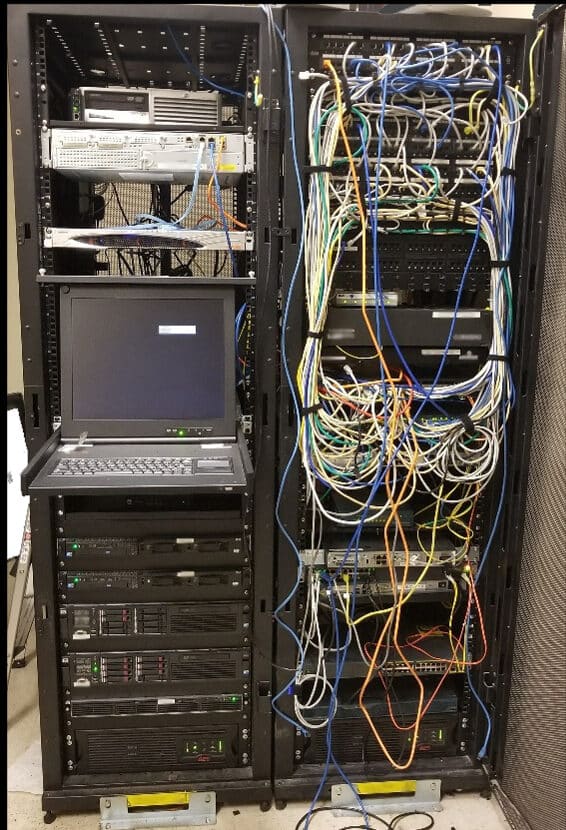Are you a business owner looking to get cybersecurity insurance?
Having a hard time getting a policy because you don’t have a Multi-factor Authentication protocol in place? Bridgehead IT is here to help.
Multi-factor Authentication (MFA) is becoming increasingly prevalent as a cyber security measure. In fact, without an MFA you will likely be denied cyber insurance. Here’s why it’s now required to secure cyber insurance.
Many businesses believe that the firewalls and other anti-virus protocols they have in place are more than enough. Unfortunately, they aren’t. As technology advances, so do online threat actors.
If you are looking for more information on Multi-Factor Authentication (MFA) and the benefits of having it incorporated into your business practices, you have come to the right place. We will go over what MFA is and how Bridgehead IT can help.

What Is Multi-Factor Authentication?
Also known as MFA, Multi-factor authentication is an extra security step that each person needs to go through before they have access to a certain system. After you put in your username and password, the system will then direct you to an extra authentication screen. This application will ask you to enter a numerical code that you received from either a text, authentication app or email. If you are unable to provide this code, you will not have access.
Companies, including us at BridgeheadIT, use Multi-factor Authentication to verify who has access to certain parts of their organization’s resources. The two-step authentication process is most commonly used when employees are trying to access their organization’s VPN.
Extra 2 Factor Authentication requirements:
- Knowledge
- Possession
- Inherence
The extra knowledge rule encompasses the “who” behind what someone knows. For example, one person may know the PIN to access a specific file that other employees may not have access to. This also includes the answers to specific security questions to verify further who is trying to access certain accounts.
Possession deals with the things that an employee or an associate has, such as a badge. This also can include any QR codes or passes to gain access.
Inherence encompasses the biometric type of data. Biometric data includes fingerprints and face and voice recognition.
When you enable some form of 2-factor verification, you will receive a notification if someone tries to log into their accounts. If you receive a notification email about a failed login, reach out to your IT department. They will reset your password, and they will secure your data to prevent any data leaks.
Additionally, Bridgehead IT is home to a team of cyber security professionals that offer 24/7 assistance, alongside preventative system monitoring.

What Is Cyber Insurance?
Your business may already have a property and general liability insurance policy, but does your organization have cyber insurance? Cyber insurance is a type of insurance that protects your business from various kinds of technology-related risks. Currently, there are two types of cyber insurance: Data Breach Insurance and Cyber Liability Insurance. We will go over both examples below.
If you are unsure of what your business needs, our team at Bridgehead IT can assist with securing said insurance and managing requirements.
Data Breach Insurance
If your company obtains and stores personally identifiable information or personal health information, you must buy Data Breach Insurance. This type of cyber protection helps protect you and your company if your customer’s personal information falls into the hands of a hacker or online threat actor.
Data Breach Insurance helps notify your affected customers of the breach. This coverage also assists in hiring a public relations firm. Data Breach Insurance offers credit monitoring services to breach victims.
Extra Data Breach Coverage
Depending on who you decide to get your insurance policy through, you may have the opportunity to add on extra cyber protection coverages. Many companies offer coverage that will help replace any income lost during the data breach. If you cannot run your business due to the breach, you can make a claim under that coverage. Some companies even offer extortion coverage. This type of coverage helps you if someone steals your data and demands a ransom (ransomware).
Cyber Liability Insurance
This type of cyber insurance is best for larger companies because of their susceptibility. Cyber liability helps pay for any privacy investigations. It also covers any lawsuits that come about after an attack. Cyber Liability Insurance is an excellent coverage against threat actors. These hackers want to get into your system, steal data, and prevent access to your network unless a ransom is paid.
If this hacker succeeds in infiltrating your system and holding your files for ransom, this insurance will help your business recover from any financial losses. If you face any regulatory fines from any federal or state agencies, Cyber Liability Insurance can cover those fees.
Multi-Factor Authentication and Cyber Insurance
Insurance companies that offer cyber insurance policies need you to have MFA measures in place. MFA adds an extra layer of protection. Those hesitant companies who do not want to adopt MFAs believe that they need to buy hardware. That isn’t always true.
Others believe that this extra layer of security adds an unnecessary extra step. This extra two-step verification can make or break your business.
Who Should Have MFA?
In short, everyone who has network access. This extra layer of protection will protect your systems from any ransomware.
A lot of hackers like to use phishing to steal your company’s sensitive information. Cybercriminals also use key-logging cyberattacks to get the information they want.
Multi-Factor Authentication and Cyber Protection
Ransomware or social engineering claims are very common. These claims cost many insurance companies hundreds of thousands of dollars. They also need expensive, extensive investigations to pinpoint the breach.
The main reason insurance companies need your company to have MFA protocols in place is to help prevent these massive breaches.
Yes, these incidents happen often but companies that do not have MFAs in place are targeted first.
These breaches start with compromised login information and passwords. Your company’s login information is the weakest point of your company’s footprint. Most of your employees use the same passwords across different systems.
Your employees also use very weak passwords. Sometimes they also share their credentials with other people. Your employees may also provide their login information to a cybercriminal without knowing. Implementing multi-factor authentication into your systems will help reduce a large number of cyberattacks.
However, with a technology firm like Bridgehead IT as your partner, we can actively prevent attacks and monitor your networks for malware or suspicious activity.
Why Use MFA in Your Business?
A recent study conducted in 2021 showed that the average cost of a data breach was around $4.94 million. Remote work affected the speed of response and the time required to identify and handle data breaches.
Organizations that had more than half of their workforce working remotely found it harder to locate a breach. They also noticed that it took months before they could locate the cause of the breach. The last thing you need is for your business to go under because of a data breach that you failed to control. Implementing Multi-factor Authentication into your business practices helps prevent a breach from draining your business’s bank account.
However, the average recovery time for a small to medium-sized business that employs Bridgehead IT is approximately 3 days.
It Can Strengthen Your Existing Systems
Most organizations already have firewalls and anti-virus protections in place, but that is not enough to protect you from a massive breach. These layers of protection are only as good as the authentication steps in place. Multi-factor Authentication helps to make your existing systems operate optimally.
Helps Protect Your High-Value Targets
Executive and administrative accounts are way more valuable than accessing your employees’ credentials. A hacker may get into your employee’s access area to locate these administrators. Once they find the executive files, they will figure out a way to get in. These files are of higher value because they allow a hacker to access a broader range of your network. Administrative accounts also tend to have more sensitive business information. Hackers find business information to be very valuable. Multi-factor Authentication helps to keep these files safe.
MFA Limits Credential Theft
Multi-factor Authentication protocols make it harder for cybercriminals to steal credentials. Even more so, it helps to limit the usefulness of those stolen credentials. A cybercriminal won’t be able to log in without the MFA information.
Even if a cybercriminal obtains your employee’s user ID and passwords. For example, your company may require your employees to input a one-time passcode. This code is sent to the employee’s phone. Since this layer of protection requires a code from a different device, the hacker won’t be able to get in.
Protect Your Organization’s Data Today
The last thing any business owner wants is to find out that a massive breach in your data just took place. While you scramble to find a solution, you lose out on generating income, and you face the possibility of a lawsuit. Having a reliable multi-factor authentication process in place at your business is an excellent investment.
Once you obtain an MFA, you will receive the green light from most insurance companies to get a cyber protection policy. We can help provide more information on multi-factor authentication and security protocols to protect your organization.
Contact us today about a security risk assessment for your business.
(210) 477-7900
WHAT YOU NEED TO KNOW
Multi-factor Authentication is Now Required to Secure Cyber Insurance.
Bridgehead IT is a CMMC Registered Provider Organization (RPO).
We have expertise in CMMC Compliance and a full range of Cyber Security and Compliance Solutions.



